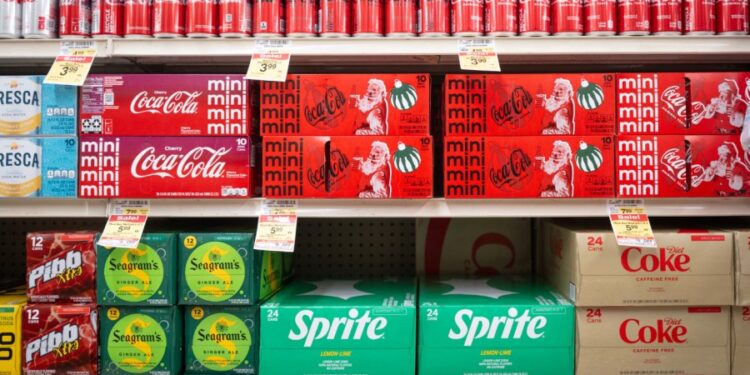
The Trump administration has pledged to slash government spending while promising to “make America healthy again.”
Congress could take a firm stride in this direction by enacting the recently reintroduced “Healthy SNAP Act,” to exclude unhealthy food and beverages, starting with soda, from the Supplemental Nutrition Assistance Program program — something that is already done for alcohol and tobacco.
SNAP is a lifeline for millions of Americans experiencing food insecurity. But it is also a lifeline for the producers of unhealthy, sometimes addictive, ultra-processed foods and beverages. An astounding 20 percent of the $113 billion annual SNAP budget — $23 billion annually — is used to pay for unhealthy foods and beverages purchased by SNAP participants.
Without a policy change, taxpayers are projected to spend $240 billion on unhealthy food through SNAP over the coming decade — a staggering $60 billion for soda alone. This serves neither the economic interests of taxpayers nor the health interests of SNAP participants, most of whom support ending the use of SNAP for purchasing soda, snacks and other unhealthy foods.
In its current form, SNAP operates as a de facto subsidy program that props up some of the unhealthiest parts of the food industry. Take, for example, the most frequently purchased item in SNAP — sugar-sweetened beverages, which comprise 9.3 percent of all SNAP expenditures. This part of the SNAP subsidy, by our estimates, drives 20 to 25 percent of U.S. revenues for Coca-Cola and Pepsico.
Besides providing no nutritional value, the regular consumption of sugary drinks produces health outcomes similar to alcohol, including liver disease, obesity, high blood pressure and other cardiometabolic diseases.
Current policy is also economically inefficient because taxpayers pay twice to keep unhealthy foods in SNAP. First, they pay for procuring the unhealthy food itself, at a rate of $23 billion annually. Second, they pay for the healthcare of SNAP participants who develop nutrition-related diseases from consuming these foods, and the costs here are staggering.
A recent Rockefeller Foundation report found that diet-related diseases cost the U.S. $1.1 trillion annually, amounting to 25 percent of total health expenditures. Medicaid alone cost $606 billion in 2023 — about 10 percent of the federal budget.
Because so much of the diet of low-income Americans currently comprises unhealthy ultra-processed foods and beverages, and because these products can be addictive, Congress should take an incremental approach to phasing out the SNAP subsidy. It should start by excluding soda and other sugar-sweetened beverages from SNAP.
Initially, program savings should be used to incentivize SNAP participants to purchase more fresh fruits and vegetables, providing a much-needed agricultural stimulus for specialty crop production.
One study found that, by just excluding soda from SNAP while incentivizing fruit and vegetable purchases, we could prevent 93,933 cardiovascular disease events annually, saving $4.33 billion. Over 10 years, that’s another $43 billion in taxpayer savings.
Like cigarettes and alcohol, which are already excluded from SNAP, unhealthy ultra-processed foods are hard to quit. This is because many ultra-processed foods and beverages are intentionally designed to be addictive, or “hyper-palatable,” by combining unnatural amounts of sugar, fat and salt with “cosmetic” chemical additives that enhance flavor, mouthfeel, and texture.
Many major U.S. food producers, including Kraft, Nabisco, 7UP, General Foods and Del Monte, were owned for decades by the tobacco giants Philip Morris and RJ Reynolds. These companies shared their sophisticated product formulation and marketing tactics with their food subsidiaries. As a result, people on an ultra-processed diet eat significantly more calories and gain weight. And over time, populations on diets high in ultra-processed food are prone to diabetes, cancer, cardiovascular disease and premature mortality.
While the new class of GLP-1 agonist medications (e.g., Ozempic, Mounjaro) may help some patients manage their cravings for hyper-palatable foods, heightened demand for these medications is producing unsustainable spending increases in state Medicaid programs and Medicare.
Due to their health harms and addiction potential, alcohol and tobacco have been excluded from SNAP for many decades, although participants have always been free to buy these products with their own money whenever they wish. The same rule should apply to unhealthy ultra-processed foods, starting with soda, that have a negative footprint on health like alcohol and tobacco.
Food industry lobbyists may claim that they seek to preserve SNAP as is in the name of fighting hunger and protecting participants from government paternalism. But the real debate comes down to ending a hidden subsidy program that enriches the food industry at the expense of everyone else.
Laura Schmidt is a professor in the Institute for Health Policy Studies at the University of California San Francisco School of Medicine. Hans Taparia is a clinical professor at the New York University Stern School of Business. Robert Lustig is a professor emeritus at the University of California San Francisco.






